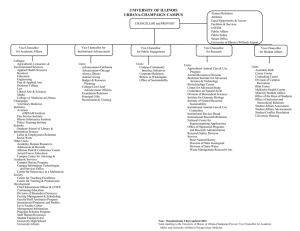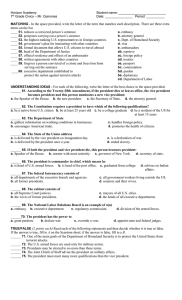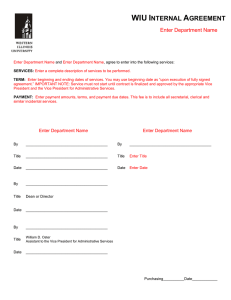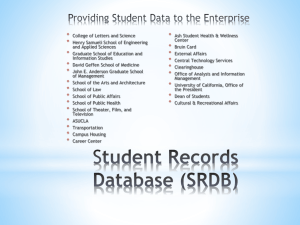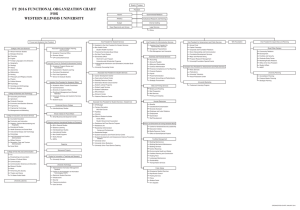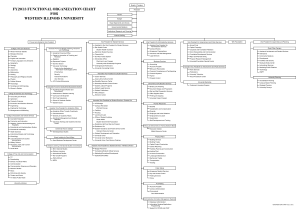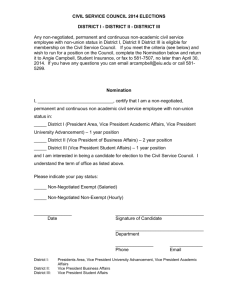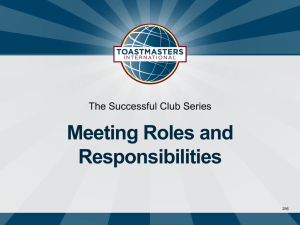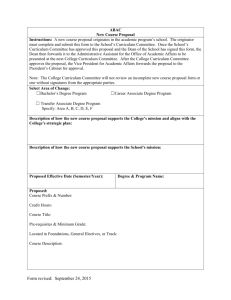1 In an emerging global community, universities must educate students so... Higher Values in Higher Education A Plan for Western Illinois University
advertisement
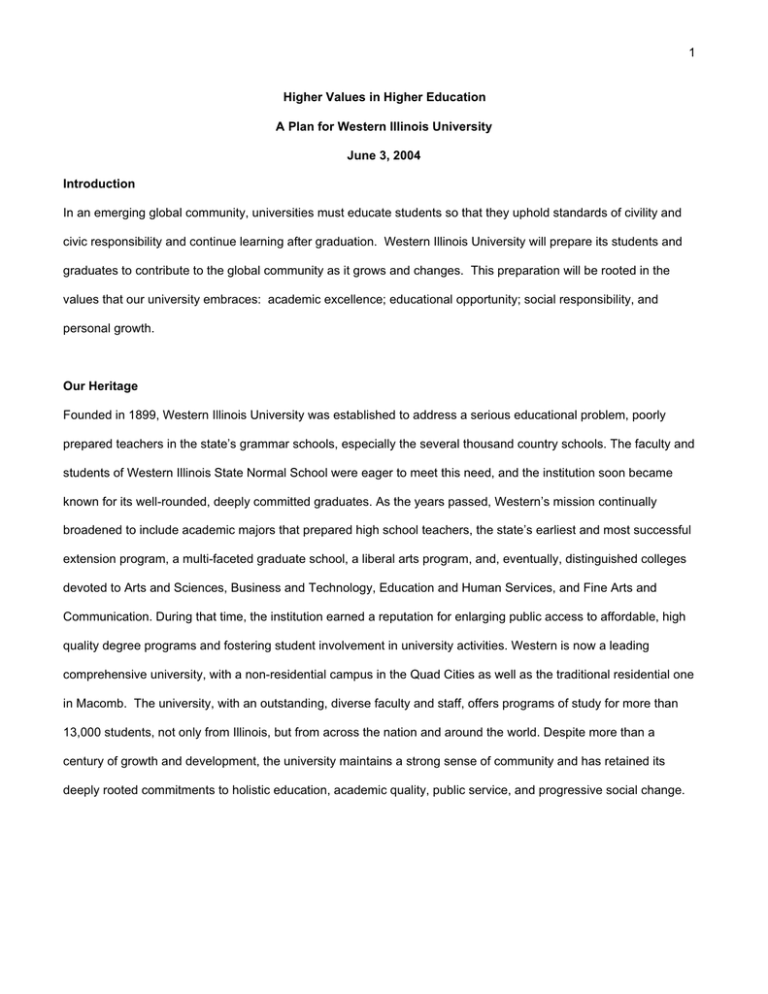
1 Higher Values in Higher Education A Plan for Western Illinois University June 3, 2004 Introduction In an emerging global community, universities must educate students so that they uphold standards of civility and civic responsibility and continue learning after graduation. Western Illinois University will prepare its students and graduates to contribute to the global community as it grows and changes. This preparation will be rooted in the values that our university embraces: academic excellence; educational opportunity; social responsibility, and personal growth. Our Heritage Founded in 1899, Western Illinois University was established to address a serious educational problem, poorly prepared teachers in the state’s grammar schools, especially the several thousand country schools. The faculty and students of Western Illinois State Normal School were eager to meet this need, and the institution soon became known for its well-rounded, deeply committed graduates. As the years passed, Western’s mission continually broadened to include academic majors that prepared high school teachers, the state’s earliest and most successful extension program, a multi-faceted graduate school, a liberal arts program, and, eventually, distinguished colleges devoted to Arts and Sciences, Business and Technology, Education and Human Services, and Fine Arts and Communication. During that time, the institution earned a reputation for enlarging public access to affordable, high quality degree programs and fostering student involvement in university activities. Western is now a leading comprehensive university, with a non-residential campus in the Quad Cities as well as the traditional residential one in Macomb. The university, with an outstanding, diverse faculty and staff, offers programs of study for more than 13,000 students, not only from Illinois, but from across the nation and around the world. Despite more than a century of growth and development, the university maintains a strong sense of community and has retained its deeply rooted commitments to holistic education, academic quality, public service, and progressive social change. Our Values ACADEMIC EXCELLENCE Central to our history and tradition is the commitment to teaching, to the individual learner, and to active involvement in the teaching-learning process. Western Illinois University's highly qualified, diverse faculty promotes critical thinking, engaged learning, research and creativity in a challenging, supportive learning community. We are committed to an academic environment that encourages lifelong development as learners, scholars, teachers, and mentors. EDUCATIONAL OPPORTUNITY Western Illinois University values educational opportunity and welcomes those who show promise and a willingness to work toward achieving shared educational goals. We are committed to providing accessible, high quality educational programs and financial support for our students. PERSONAL GROWTH Because Western Illinois University values the development of the whole person, we are committed to providing opportunities for personal growth in an environment that supports the development of wellness, ethical decision making and personal responsibility. SOCIAL RESPONSIBILITY Western Illinois University is committed to equity, social justice, and diversity, and will maintain the highest standards of integrity in our work with others. We will serve as a resource for and stimulus to economic, educational, cultural, environmental, and community development in our region and well beyond it. Our Vision Western Illinois University will be the leading comprehensive university in the United States. Our Mission Western Illinois University, a community of individuals dedicated to learning, will have a profound and positive impact on our changing world through the unique interaction of instruction, research, and public service as we educate and prepare a diverse student population to thrive in and contribute to our global society. Translating Our Values Into Action I. STUDENTS Since we value academic excellence, social responsibility and personal growth, Western Illinois University will educate students intellectually as individuals within their chosen fields, and socially as citizens of the global society and as graduates responsible to their communities. A. Student recruitment and admissions Goal: To achieve optimum enrollment 1. Develop a universitywide plan for recruitment that: a. attracts a well-qualified, diverse student body; [Admissions, Academic Affairs and Student Services] b. involves the entire university and advances the campus’ overall goals and objectives; [Entire University] c. offers greater on-site admissions opportunities (fairs, receptions) in the Chicago area; [Admissions] d. 2. involves current students and alumni where appropriate. Assess the model used in recruiting students to campus. Look for additional ways to bring students through the process of application and admission, and evaluate our current practices for effectiveness. [Admissions] 3. Target 12,500 students for enrollment at WIU-Macomb and increase enrollment to 3,000 students at WIU-Quad Cities by 2008 while maintaining our historically low student/teacher ratio. [Admissions, Academic Affairs, Student Services, Colleges and Departments] 4. Ascertain appropriate mix of graduate and undergraduate students at both campuses. [Academic Affairs with Colleges and Departments and Faculty Senate] 5. Increase, in selected programs, the number of transfer students who have associate degrees. Identify and target programs through which transfer students would best be served. [Admissions, Academic Affairs, Colleges, Departments and Scholarship Office] B. Student body quality and diversity Goal: To create a student body of high achieving and diverse students 1. Revise the process of admission so that requirements reflect the characteristics of successful Western Illinois University students (i.e. ACT, class rank, high school core courses, community service). [Admissions, CAGAS and Faculty Senate] 2. Review core specific requirements for admission, in light of our goal to create a student body of high achieving students. [Academic Affairs, CAGAS and Faculty Senate] 3. Review the application evaluation process for students who do not meet the established admission qualifications. [Admissions, CAGAS and University Advising and Academic Support] 4. Integrate general admission and OAS processes to define and implement a continuum of service that responds to student needs. [Admissions and University Advising and Academic Support] 5. Increase the proportion of incoming freshmen that graduate from the upper third of their classes by 10% by Fall 2006. [Admissions and Academic Affairs] 6. Increase by 10% the number of students who have ACT scores above 23 by Fall 2006. [Admissions and Academic Affairs] 7. Increase by 10% the proportion of incoming freshmen with grade point averages of 3.0 or better in college preparation courses by Fall 2006. [Admissions and Academic Affairs] 8. Continue to increase the proportional diversity of incoming students. [Admissions, Student Services, Academic Affairs, Colleges and Departments] 9. Increase the size of the Illinois Centennial Honors College by focusing on promotion, retention, and the development of pre-professional programs. [Academic Affairs and Illinois Centennial Honors College] 10. Target fund raising efforts for scholarships for first-year students. [Foundation, Development, Academic Affairs and Colleges] C. Initiatives to increase retention and graduation rates Goal: To provide support services to encourage student success and increase retention and graduation rates 1. Implement a comprehensive academic student support services system that strengthens the skills most needed for academic success. [Academic Affairs and Student Services] 2. Create, through a collaboration of Academic and Student Support Services, a mandatory orientation program for all incoming freshman and transfer students that addresses academic and social skills. [Academic Affairs and Student Services] 3. Review procedures and resources of Disability Support Services to better meet the needs of students. [Disability Support Services, Student Services and Academic Affairs] 4. Create an articulated set of first year experiences that assists students throughout their entire academic career. [Academic Affairs, Student Services and Faculty Senate] 5. Continually increase the graduation rate with a target for improvement of at least 5 percentage points by 2008. [Academic Affairs, Student Services, University Advising and Academic Support Services, Colleges and Departments] 6. In light of changes in the strategic plan, realign university procedures regarding grade appeals, graduation requirements, and academic standards. [Provost and CAGAS] 7. Develop a plan for enhancing the recruitment and integration into the campus community of international students and students from underrepresented groups. [Academic Affairs, Student Services, Admissions and Center for International Studies] 8. Continue to develop and promote Gradtrac for eligible majors. [Admissions, Marketing and University Relations] 9. Continue to promote the cost guarantee program as the first of its kind and the most comprehensive of any state university in Illinois. [Admissions, Marketing and University Relations] 10. Increase the use of internal grants versus loans to assist students in need. [Financial Aid, Scholarship Office and Foundation] D. Special initiatives to enhance the educational experience and personal growth of students Goal: To expand student learning and growth through opportunities that blend classroom learning and campus life 1. Create opportunities for students, faculty, and staff to have purposeful conversations about diversity and equality issues. [Affirmative Action, Human Resources, Student Services and Academic Affairs] 2. Formalize a committee to establish a universitywide theme one year in advance. Encourage integration of a speaker series that develops the theme. [President] 3. Integrate the university theme into the first year experience program and curricula. [Student Services, Academic Affairs and Faculty Senate] 4. Find new ways to utilize alumni and practicing professionals to enhance students’ experiences (e.g., electronic mentors, career days). [Alumni Programs, Academic Affairs and Student Services] 5. Establish a scholar/expert-in-residence program of interdisciplinary interest and structure his/her work for meaningful involvement with departments/colleges/campus addresses. [Academic Affairs, Colleges, Departments, Foundation, Development and Office of Sponsored Projects] E. Campus life Goal: To create a campus environment that supports a wide range of student interests and provides opportunities for leadership development and personal growth 1. Increase student participation in and appreciation of cultural, aesthetic and intellectual events on campus. [College of Fine Arts and Communication, Bureau of Cultural Affairs, Office of Student Activities, University Relations, Marketing, Academic Affairs and Student Services] 2. Support an NCAA Division I varsity intercollegiate athletics program that is committed to broadbased participation opportunities, promotes academic achievement, maintains financial stability, and demonstrates strict adherence to the NCAA operating principles related to governance and rules compliance, academic integrity, equity and student athlete welfare. [Athletics, University Relations, Student Services and Advancement and Public Services] 3. Engage students in the life of the university and community by encouraging greater participation in structured out-of-class activities (theatre, music, athletics, student organizations, etc.). [Academic Affairs and Faculty Senate] 4. Develop educational opportunities designed to raise awareness of environmental issues. [Student Services, Academic Affairs, Faculty Senate and Administrative Services] 5. Develop strategies to encourage and support a service ethic in students. [Academic Affairs, Student Services and Faculty Senate] 6. Develop an expectation of civic engagement for all students. [Academic Affairs, Student Services and Faculty Senate] 7. Develop strategies to increase student participation in student governance. [Student Services and Office of Student Activities] 8. Engage students in programs that foster and reinforce wellness. [Student Services, Beu Health Center and Campus Recreation Center] 9. Explore ways to encourage and strengthen shared governance and student participation in university decision-making. [Student Services and Office of Student Activities] 10. Aggressively support activities that increase interaction among students of all levels and diverse backgrounds. [Student Services and Academic Affairs] F. Excellence in undergraduate programs Goal: To achieve excellence in undergraduate education 1. Review the process by which new undergraduate degree programs are proposed. [Academic Affairs and Faculty Senate] 2. Review the potential for expanded degree programs, such as: a. B.B. in Supply Chain Management b. B.B. in Construction Management c. B.A. in Digital Photography or option in Digital Photography in the B.F.A. in Art d. B.S. in Nursing e. B.S. in Forensic Science f. Bachelors degree in International Business [Academic Affairs, Colleges, Departments and Faculty Senate] 3. Explore new offerings for undergraduate programs in the Quad Cities. [Academic Affairs, Colleges, Departments and Faculty Senate] 4. Develop a plan for assessment that incorporates accreditation and influences curriculum revision. [Academic Affairs, Colleges, Departments, Student Services, Provost and Faculty Senate] 5. Review student-advisor ratios in light of national norms to ensure students are receiving the appropriate levels of attention. [Academic Affairs and Deans] 6. Seek appropriate ways for graduate programs to contribute to undergraduate education, i.e., shared research. [Graduate Council] 7. Beginning with the students’ first year, find additional ways of mentoring students and advising them of graduate and career opportunities in their field of study. [University Advising and Academic Support and Career Services] 8. Explore the consequences posed by internet classes to the residential campus experience. [Academic Affairs, UPI and Distance Education] 9. Develop internet classes to meet the educational needs of site-bound students. [Departments and Colleges] 10. Evaluate the use of service learning pedagogy in the undergraduate program and establish a structure for service learning if appropriate. [Provost, Deans, Colleges, Departments and Volunteer Center] 11. Define goals for summer school and fund them appropriately. [Summer School Committee and Vice Presidents] 12. Identify ways to enhance pre-professional programs through recruitment and promotion, timely program review, alumni advisory boards, internships, scholarships, and dual-degree arrangements with select universities. [Academic Affairs] 13. Focus multi-disciplinary approaches to learning by developing curriculum and programs within Centers and Institutes. [Academic Affairs and Colleges] 14. Ensure that computer literacy is an integral part of the undergraduate experience and that our graduates have mastered the use of informational technologies. [Academic Affairs and Faculty Senate] 15. Create an Institute for Environmental Studies [College of Arts and Sciences] 16. Develop a Survey Research Center through partnerships between the Departments of Political Science, Sociology/Anthropology, Psychology, and the Illinois Institute for Rural Affairs [College of Arts and Sciences]. G. Excellence in graduate programs Goal: To achieve excellence in graduate education 1. Revisit the goals for graduate programs to include: a. Reviewing criteria and process for admission to the graduate school. b. Developing a plan for assessment that incorporates accreditation and influences curriculum revision. c. Expanding resources for graduate assistantships as a means of attracting a diverse and high quality pool of graduate students. Compare graduate assistant resources with comparable programs. d. Exploring potential new graduate offerings at WIU-Quad Cities. e. Exploring the possibility of expanding graduate programs that can be completed during summer sessions and are offered using a weekend cohort structure. f. Examining the special nature of the graduate faculty. [Academic Affairs and Graduate Council] 2. Review the process by which new graduate degree programs are proposed. [Academic Affairs and Graduate Council] 3. Review the potential for expanded degree programs, such as: a. Ed.D. in Educational Leadership b. M.S. in Computer Information Systems c. M.S. in Financial Mathematics d. M.S. in Applied Mathematics e. Post-baccalaureate certificate in Public Sector Management f. Board of Trustees master’s degree g. Terminal degree for Law Enforcement and Justice Administration [Academic Affairs and Graduate Council] 4. Complete a benchmarking exercise process of every graduate program by 2005. [Academic Affairs and Graduate Council] 5. Assess programmatic quality of graduate courses delivered nontraditionally in light of best practices. [Academic Affairs and Graduate Council] 6. Improve opportunities to train teaching assistants about teaching strategies. [Academic Affairs and Graduate Council] 7. Define goals for summer school and fund appropriately. [Academic Affairs and Graduate Council] 8. Review the potential for offering a cost guarantee for graduate school. [Vice Presidents, Graduate Council and Board of Trustees] H. Responsiveness to students Goal: To respond to student concerns with a culture of responsiveness at all service points 1. Review and, where needed, clarify and enhance resources and procedures to address student concerns. Build structures for better collaboration between the Student Assistance Center and advising resources. [Student Assistance Center and University Advising and Academic Support Services] 2. Develop procedures similar to program review for the university community to assess the various administrative units, services and programs. [Vice Presidents] 3. Conduct a comprehensive survey of student needs, behavior and attitudes using the National Survey of Student Engagement (NSSE) and develop a strategy to respond to its outcomes. [Student Services and Academic Affairs] 4. Develop a strategy to raise student awareness about financial aid and scholarship offerings. [Financial Aid, Scholarship Office, Foundation, Marketing and University Relations] 5. Identify funding or seek new funds for students in need of short-term assistance. [Advancement and Public Services and Scholarship Office] 6. Find ways to support the educational goals of non-traditional students while maintaining consistent standards for participation and involvement in the educational process. [Academic Affairs, Student Services, Foundation, Development, CAGAS and Board of Trustees] 7. Provide educational opportunities for students to learn about financial responsibility and become more proactive in solving financial problems. [Office of Student Activities, Financial Aid and Student Government Association] 8. Develop strategies for reducing the amount of student indebtedness upon graduation. [Financial Aid, Scholarship Office, Advancement and Public Services and Vice Presidents] II. PERSONNEL Central to the success of any university is the community of scholars, educators and learners. Because we believe that academic excellence, educational opportunity, social responsibility and personal growth begin with the commitment of an exceptional and dedicated faculty and staff, we will compete for and contribute to the on-going development of our most valuable resource. A. Faculty Goal: To attract, recruit, retain and develop an excellent faculty representative of the diverse and global society 1. Develop strategies to increase the recruitment and retention of faculty from targeted underrepresented groups. [Academic Affairs, Affirmative Action, Colleges and Departments] 2. As the institution’s top budget priority, continue to identify faculty salaries at peer institutions and meet or exceed the mean of those salaries within the next 5 years. [Vice Presidents] 3. In light of the strategic goals of the university, UPI and WIU administrators will work in partnership to develop contract language that will promote the recruitment, development and maintenance of high quality faculty and encourage high quality teaching, research, and creative and scholarly activities. [UPI and Provost] 4. Redesign faculty development to respond to the needs of faculty. Conduct regular needs analyses, establish priorities and determine appropriate structure and funding. [Faculty Development Office] 5. Explore ways to encourage and strengthen shared governance and faculty participation in university decision making. [President, Vice Presidents, Faculty Senate and UPI] B. Staff and Administration Goal: To develop and foster a superior staff and administration that is responsive, effective, and efficient in supporting the institution’s missions, values and objectives 1. Develop strategies to increase recruitment and retention of staff and administration from traditionally underrepresented groups. [Vice Presidents, Human Resources and Affirmative Action] 2. As the university’s highest budget priority, continue to identify administrative and staff salaries at peer institutions and meet or exceed the mean of those salaries within the next five years. [Vice Presidents and Office of Institutional Research and Planning] 3. Develop a process for the regular evaluation of administrators that includes input from a variety of constituent groups, including supervisees. [President, Vice Presidents, Faculty Senate, Civil Service Employees Council and Council of Administrative Personnel] 4. Further develop and support clearly structured training and development opportunities for staff and administration. [Vice Presidents and Human Resources] 5. Explore the pros and cons of a system of performance-based salary increases for non-collective bargaining employees. [President, Vice Presidents, Civil Service Employees Council and Council of Administrative Personnel] 6. Explore ways to encourage and strengthen shared governance and staff participation in university decision making. [President, Vice Presidents, Civil Service Employees Council and Council of Administrative Personnel] 7. Encourage qualified members of the staff to contribute where appropriate in academic areas, research and scholarly activities. [President, Vice Presidents, Deans, Chairs and Directors] III. TEACHING AND INSTRUCTION Embedded in the university’s history is a primary commitment to teaching and instruction. Curricular innovation and instructional excellence will remain the central commitment of Western Illinois University. Goal: To assist the faculty in making a career-long commitment to high quality teaching 1. Integrate global and cross-cultural education throughout the curriculum and expand opportunities for travel, study abroad and other international experiences. [Center for International Studies, Vice President for Administrative Services and Faculty Senate] 2. Integrate multicultural perspectives and pedagogy more fully into course curriculum. [Faculty Senate, Deans and Chairs] 3. Increase opportunities for faculty/student research and creative activities. [Colleges, Departments and Chairs] 4. Increase opportunities for students to participate in undergraduate research. [Colleges, Departments and Chairs] 5. Develop and implement strategies to infuse liberal arts into the entire undergraduate experience. [Faculty Senate, Provost, Colleges, Departments, Deans and Chairs] 6. Develop clearer technology support in order to enhance instructional needs. [Institutional Technology Committee, Deans and Chairs] IV. RESEARCH AND SCHOLARLY/CREATIVE ACTIVITIES Because we value academic excellence and personal growth of all members of the Western Illinois University community, we will encourage and support research, scholarly, creative activities and performing arts that strengthen the academic experience and expand the appreciation of the liberal arts. Goal: To encourage and support research and scholarly/creative activities 1. Expand the summer stipend and the University Research Council programs and establish additional means by which to support research and scholarly/creative activities. Enhance the assessment of projects to ensure that they contribute to the scholarly activities of the university. [Provost, Advancement and Public Services, Foundation, Development, Faculty Development and Office of Sponsored Projects] 2. Expand institutional resources that encourage and promote research, creative and scholarly activities with special emphasis on new and junior faculty members. [Provost, Advancement and Public Services, Foundation, Development, Faculty Development and Office of Sponsored Projects] 3. Promote entrepreneurial approaches to support research and scholarly/creative activities that tie into the priorities of the department, college, and university. [Entrepreneurship Committee, Vice Presidents, Deans, Chairs and Directors] 4. Expand a visiting scholars/artists program. [Advancement and Public Services, Provost, Colleges and Departments] 5. Establish the scholar-, expert-, or artists-in-residence program. Define campus resources and structures necessary to support an in-residence program and create a plan for a meaningful experience for the campus community. [Advancement and Public Services, Provost, Colleges and Departments] 6. Develop a unified plan for publicizing and disseminating information about research and scholarly/creative activities. [University Relations, Colleges and Departments] V. PUBLIC SERVICE A. Public Service/Outreach Goal: Western Illinois University will reach out to the region, the state of Illinois and beyond by serving as a vital economic, educational, cultural and social resource 1. Inventory and categorize WIU’s current public service and outreach activities. [Vice Presidents and Office of Institutional Research and Planning] 2. Clarify WIU’s public service mission to determine that current and future activities are linked to the mission and core values of the university. [Vice Presidents, Deans and Directors] 3. Develop the agility to respond to the emerging needs of the State of Illinois, including the Governor’s initiatives, P-16 initiatives and area economic development plans. [Vice Presidents, Deans and Directors] 4. Continue to seek national and international opportunities for faculty, staff and students to become involved in addressing training and professional development needs. [Vice Presidents, Deans, Directors and Chairs] 5. Create opportunities for increasing public involvement in cultural, intellectual and educational activities. [Marketing, University Relations, Vice Presidents, Deans, Directors and Chairs] VI. UNIVERSITY INFORMATION AND TECHNOLOGY While we cannot predict the dynamic nature of technology, we know that access to information and communication will continue to be expected and expanded. We will stay abreast of emerging technologies to ensure that our community is offered appropriate resources for learning and working. Technology will be used to enhance the educational experience and the human interaction that brings synergy to learning and personal growth. A. Library Goal: To acquire, process, make accessible, and interpret information resources 1. Evaluate and enhance the University Libraries’ electronic and print resources in light of the curricular needs of the university and statewide statistical collection norms. [Library, Provost, Colleges and Departments] 2. Improve the university’s appropriate and innovative use of information resources. [Institutional Technology Committee, Deans, Chairs, Departments, Colleges, Directors and Vice Presidents] 3. Continue to explore and participate in external and internal cooperative arrangements that support the university mission, expand the libraries’ resources, and encourage intellectual and cultural development. [Library] B. Technology Goal: To develop and implement a strategic plan that coordinates the efficient acquisition, utilization, and application of technology 1. Explore ways to be more effective and efficient with university technology resources, including the acquisition of hardware and software and the coordination of training to improve teaching and learning. [Institutional Technology Committee, Vice Presidents, Deans, Colleges, Faculty Development, Chairs and Departments] 2. Establish baseline expectations for technology, technology training, and support by discipline, area and function for students, faculty, and staff and address identified deficiencies. [Institutional Technology Committee and Vice Presidents] 3. Regularly assess user needs to guide short and long term technology planning. [Institutional Technology Committee and Vice Presidents] 4. Encourage the integration of technology where appropriate to support the university’s mission. [Institutional Technology Committee, Vice Presidents, Faculty Development and Faculty Senate] VII. PHYSICAL ENVIRONMENT The Western Illinois University campus is a place where life-long relationships are established, ideas are tested and learning is inspired. A beautiful, safe and accessible campus is indispensable in the building of a common sense of place and enthusiasm for learning. We will establish a comprehensive plan to improve and expand our university facilities keeping mindful of our responsibility to environmental sustainability and campus safety. A. University improvements Goal: To expand and improve facilities to meet the needs of university constituencies and reflect the core values of the university 1. Secure funding for the planning and construction of a Performing Arts Center for WIU-Macomb. [President, Vice Presidents, Foundation, Development and Board of Trustees] 2. Secure funding for the expansion of WIU-Quad Cities. [President, Vice Presidents, Foundation, Development and Board of Trustees] 3. Secure funding for the construction of the Gwendolyn Brooks Cultural Center. [President, Vice Presidents, Foundation, Development and Board of Trustees] 4. Continue to identify private sources of funding for the facilities projects identified by the Department of Athletics in its Target Western Forward campaign. [Athletics, Foundation, President and Vice Presidents] 5. Conduct an audit of all university facilities and infrastructure to determine life-cycle and replacement needs of equipment and ancillary structures. [Vice President for Administrative Services, Physical Plant and Auxiliary Facilities System] 6. Create a master plan for campus facilities that reflects the institution’s core values. [Physical Plant and Campus Community] 7. Continue to work in partnership with the City of Macomb and other governmental agencies to improve the access and entranceways to campus. [Vice President for Administrative Services, Macomb and local legislators] 8. Continue to work with the City of Macomb to improve the housing quality in the areas near campus through regulation and cooperation. [Vice President for Student Services, Macomb, Student Tenant Union, Student Government Association and Community and University Police Partnership] B. Environmental impact and sustainability Goal: To improve the university’s commitment to environmental sustainability 1. Incorporate a purchasing preference for recycled and environmentally-friendly products. [Vice President for Administrative Services] 2. Decrease solid waste production and improve the recycling program. [Vice President for Administrative Services, Auxiliary Facilities System and Campus Community] 3. Conduct an energy audit and seek ways to improve energy efficiency and water conservation. [Physical Plant and Campus Community] 4. Continue to enhance the university landscapes with sensitivity to issues of maintenance and water conservation and preference for species native to Illinois. [Vice President for Administrative Services and Physical Plant] 5. Review transportation systems in light of health, safety and environmental issues with particular attention to the use of all vehicles and vehicular traffic. [Vice President for Administrative Services, Vice President for Student Services, Transit System and University Garage] 6. Evaluate sources of pollution, consider prevention and reduction, and pursue mitigation. [Vice President for Administrative Services and Vice President for Student Services] 7. Develop and begin to implement a plan to address any identified deficiencies. [President and Vice Presidents] VIII. UNIVERSITY PARTNERS Because the educational experience gives rise to the professional endeavors and personal choices our graduates will make throughout their lives, Western Illinois University will actively seek the involvement and support of our graduates and other university partners. A. Alumni Goal: To identify additional ways to maintain alumni involvement and increase their commitment to and partnership with the university community 1. Enhance communication between the university and its alumni. [Advancement and Public Services, Alumni Programs, University Relations and Marketing] 2. Develop programs that encourage alumni to share their experiences and expertise with students, on and off campus. [Alumni Programs, Academic Affairs and Student Services] 3. Explore ways to involve alumni in improving educational programs and furthering the university’s planning goals. [Alumni Programs, Student Services and Academic Affairs] 4. Provide programs and services that link alumni to each other, the Alumni Association and the University. [Alumni Programs] 5. Develop a coordinated plan to link international alumni to campus. [Alumni Programs and Center for International Studies] B. Board of Trustees Goal: To assist the university in the implementation of the strategic plan 1. Review all university requests in light of the strategic plan. [Board of Trustees] 2. Assist with university efforts to achieve governmental and external funding for the plan. [Board of Trustees] 3. Assist university with local, regional and statewide constituencies to achieve support for the plan. [Board of Trustees] 4. Develop new avenues for campus interaction with Board of Trustee members. [Board of Trustees, President and Vice Presidents] C. Macomb and Quad Cities communities Goal: To further cultivate positive relationships between our campuses and host communities 1. Explore opportunities to develop additional partnerships with area leaders that benefit the university and the community, particularly in the areas of economic and cultural development. [President, Vice Presidents, Associate Provost, Macomb and Quad Cities Chambers of Commerce] 2. Expand collaborative efforts designed to address issues that affect campuses and communities. [President, Vice Presidents, Associate Provost, Quad Cities Chamber of Commerce, Macomb Government and Community and University Police Partnership] 3. Where appropriate, involve community members to help transition newcomers to the university. [President, Vice Presidents, Macomb and Quad Cities Chambers of Commerce, NAACP, school districts, hospitals, Faculty Development and Human Resources] D. Development Goal: To assist the university in addressing its strategic initiatives 1. Design a new capital campaign focused on priorities identified in the university strategic plan. [Advancement and Public Services, Foundation, Development, Foundation Board, President, Vice Presidents, Deans, Chairs and Directors] 2. Further the interface/integration of college/unit and central development office fund raising efforts. [University Relations, Marketing, Integrated Marketing Committee, Deans, Directors, Chairs, President, Vice Presidents and Associate Provost for Quad Cities] E. Marketing/Communications Goal: To further develop consistent and integrated university marketing initiatives 1. Focus the marketing position of the university on the strategic planning document, vision, mission and goals. [President, Vice Presidents, Associate Provost for Quad Cities, University Relations, Marketing and Integrated Marketing Committee] 2. Continue to implement strategies outlined in the university’s integrated marketing plan. [President, Vice Presidents, Associate Provost for Quad Cities, University Relations, Marketing and Integrated Marketing Committee] 3. Develop ways to tie university history and culture into campus programming. [President, Vice Presidents, Associate Provost for Quad Cities, University Relations, Marketing and Integrated Marketing Committee] Conclusion As a community, we have paused to reassess our university’s values, mission and vision and set a course that reflects our history and sets our expectations for our future. The ideas included in this plan represent a beginning, but one that requires shared commitment, careful and constant analysis of its initiatives and progress. Much remains to be done. The strength of any strategic plan lies in the process of assuring the completion of goals and priorities that emerged during planning. Phase II of the planning process requires university community members to define implementation strategies and resources for each priority. Implementation teams will be defined by area of expertise and impact. The outcomes of the implementation and resource-planning phase will also be communicated openly and input will be sought from all members of the university community. Successful and realistic planning requires linking goals and priorities to resources. Accomplishing our goals will inevitably require additional resources, public and private, and necessitate prudent and judicious decisions about existing resources. The strategic plan began as a community effort and will go forward with the same intention. Through focus groups, open meetings and website discussions we hope to elicit ongoing feedback as we refine the plan and create future strategies. 20 COMMITTEE James Ackil Professor, Psychology Maurine Magliocco Professor, English John Quincy Adams Professor, Educational and Interdisciplinary Studies Shawn Meagher Assistant Professor, Biological Sciences Suzanne Bailey Associate Professor, Law Enforcement and Justice Administration WIU-Quad Cities Larry Mortier Vice President for Advancement and Public Services Bonnie Barker Public Information Specialist, University Relations David Beveridge Dean, College of Business and Technology James Butterworth* Dean, College of Fine Arts and Communication Nick DiGrino Department Chairperson, Recreation, Park and Tourism Administration Charles Gilbert Director, Institutional Research and Planning Christopher Mullins-Silverstein President, Student Government Association WIU-Macomb Joyce Nielsen Dean, Extended and Continuing Education Randy Powell Director, Auxiliary Services Council on Administrative Personnel Representative Joseph Rallo Provost and Academic Vice President Phyllis Farley Rippey* Dean, College of Arts and Sciences Alvin Goldfarb President Patricia Sartore Director, Beu Health Center Council on Administrative Personnel Representative John Hallwas Professor, English Krista Bowers-Sharpe Instructor, Malpass Libraries Trish Hammond Student Trustee, WIU Board of Trustees Bonnie Smith-Skripps Dean, College of Education and Human Services Egla Hassan Professor, Theatre Emeric Solymossy Associate Professor, Management WIU-Quad Cities Thomas Helm Dean, College of Arts and Sciences James Huesmann Assistant Provost for Computing and Information Technology and Dean of Libraries W. Garry Johnson Vice President for Student Services Megan Johnson Graduate Student, College Student Personnel Gene Kozlowski Dean, College of Fine Arts and Communication Scott Lawrence President, Student Government Association WIU-Quad Cities Eric Stiffler* Provost and Academic Vice President Jackie Thompson Vice President for Administrative Services Tom Tomlinson Professor, Law Enforcement and Justice Administration Rick Williams Supervisor, Data Processing, University Libraries Civil Service Executive Council Paula Wise Professor, Psychology 21 Support Staff Beth Oakley Staff Secretary, Vice President for Student Services Candace Winters-March Affirmative Action Intern Kathy Cavins Facilitator Associate Vice President for Student Services *Indicates past membership Revised: MBO 06/03/04
